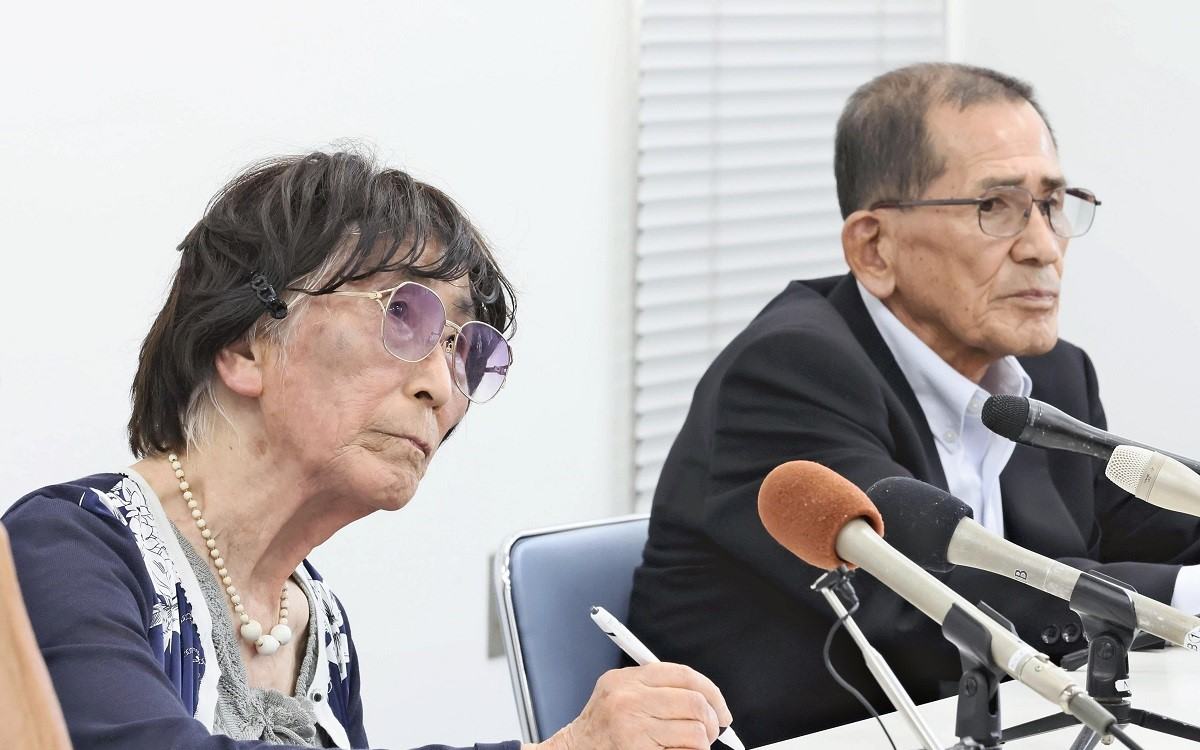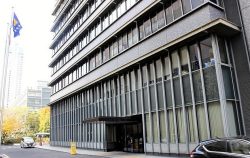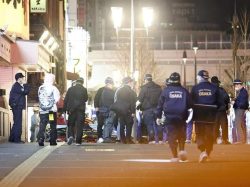Nagasaki Atomic Bomb Survivors, Local Govts Express Mixed Feelings Over Ruling; Plaintiffs Vow to Continue to Fight ‘Until Last Breath’

Chiyoko Iwanaga, left, leader of the plaintiffs, and Takeshi Yamauchi attend the plaintiffs’ meeting after the ruling in Nagasaki on Monday.
17:00 JST, September 10, 2024
NAGASAKI — Monday’s ruling, in which only some of the plaintiffs who were outside of the atomic bombing radius in Nagasaki were recognized as hibakusha, drew a line in the sand based on where people were at the time the bomb was dropped in 1945.
In a lawsuit filed by 44 plaintiffs seeking recognition as hibakusha, the Nagasaki District Court recognized only 15. Plaintiffs felt resentment, and local governments expressed mixed feelings regarding the decision.
“At last, I was finally recognized as a hibakusha. It took a really long time,” 90-year-old Sogo Matsuda said, quietly reflecting on his joy after the verdict.
When the bomb was dropped, Matsuda was 11 years old and was in the former Koga Village — now a part of Nagasaki — 9.7 kilometers from the hypocenter.
Black ash rained down, piling on top of vegetables in the fields and on the local water supply point. He wiped away the ash and ate the food to fill his stomach.
Eventually, his gums began to swell and bleed, and about 15 years ago, he developed prostate cancer.
The court ruled Monday that there was a probability that “black rain” containing radioactive materials fell in the former villages of Koga, Yagami and Toishi, and the plaintiffs who lived in these areas were recognized as hibakusha under the Atomic Bomb Survivors’ Assistance Law. Although Matsuda has no memory of the rain, he and his wife, Mutsue, 86, were recognized as atomic bomb survivors.
However, ash and other substances observed in many areas were not considered radioactive fallout, and 29 of the plaintiffs were not granted recognition.
“What’s the difference between rain and ash? There must have both been affected by radiation,” Matsuda said. “All the plaintiffs are hibakusha.”
Discriminatory
At a gathering of plaintiffs held in Nagasaki after the ruling, the mood was somber.
Chiyoko Iwanaga, 88, the leader of the plaintiffs’ group, said she was “relieved” to hear that the court had ruled in favor of some of the plaintiffs but at the same time was “not satisfied” that two-thirds of the plaintiffs, including herself, were dismissed.
“It’s unreasonable and discriminatory,” Iwanaga said. “I won’t bow down, and I’ll fight until my last breath.”
Takeshi Yamauchi, 81, from Isahaya in the prefecture, whose appeal was also rejected, said he was “disappointed.” However, Yamauchi said he still has hope that the central government will step in, and referred to Prime Minister Fumio Kishida saying the government would “consider realistic measures,” when they met on Aug. 9 in Nagasaki.
At the August meeting, which was Kishida’s first meeting with people who were exposed to an atomic bombing but were outside the designated areas set by the government, the prime minister told Health, Labor and Welfare Minister Keizo Takemi to “coordinate specific measures so that a reasonable solution can be reached.”
While discussions between the Health, Labor and Welfare Ministry, Nagasaki Prefecture and Nagasaki City are underway behind closed doors, no concrete solutions have been made yet.
‘The city sympathizes’
Nagasaki Prefecture and Nagasaki City, which are responsible for issuing atomic bomb survivor’s certificates as part of the health ministry’s statutory duties, are positioned as defendants. However, they have also been requesting the ministry to provide aid to atomic bomb survivors under the new criteria, similar to those implemented in Hiroshima.
After the ruling, Nagasaki Mayor Shiro Suzuki said: “Despite being the defendant, the city sympathizes with the feelings of hibakusha and has been asking the central government to provide relief. This is not the verdict that the atomic bomb survivors wanted, and we have very mixed feelings about it.”
“We will continue to persistently urge the central government to accelerate and advance efforts toward the relief of atomic bomb survivors,” Suzuki added.
Top Articles in Society
-

Man Infected with Measles Reportedly Dined at Restaurant in Tokyo Station
-

Man Infected with Measles May Have Come in Contact with Many People in Tokyo, Went to Store, Restaurant Around When Symptoms Emerged
-

Woman with Measles Visited Hospital in Tokyo Multiple Times Before Being Diagnosed with Disease
-

Australian Woman Dies After Mishap on Ski Lift in Nagano Prefecture
-

Foreign Snowboarder in Serious Condition After Hanging in Midair from Chairlift in Nagano Prefecture
JN ACCESS RANKING
-

Japan PM Takaichi’s Cabinet Resigns en Masse
-

Japan Institute to Use Domestic Commercial Optical Lattice Clock to Set Japan Standard Time
-

Israeli Ambassador to Japan Speaks about Japan’s Role in the Reconstruction of Gaza
-

Man Infected with Measles Reportedly Dined at Restaurant in Tokyo Station
-

Videos Plagiarized, Reposted with False Subtitles Claiming ‘Ryukyu Belongs to China’; Anti-China False Information Also Posted in Japan





















